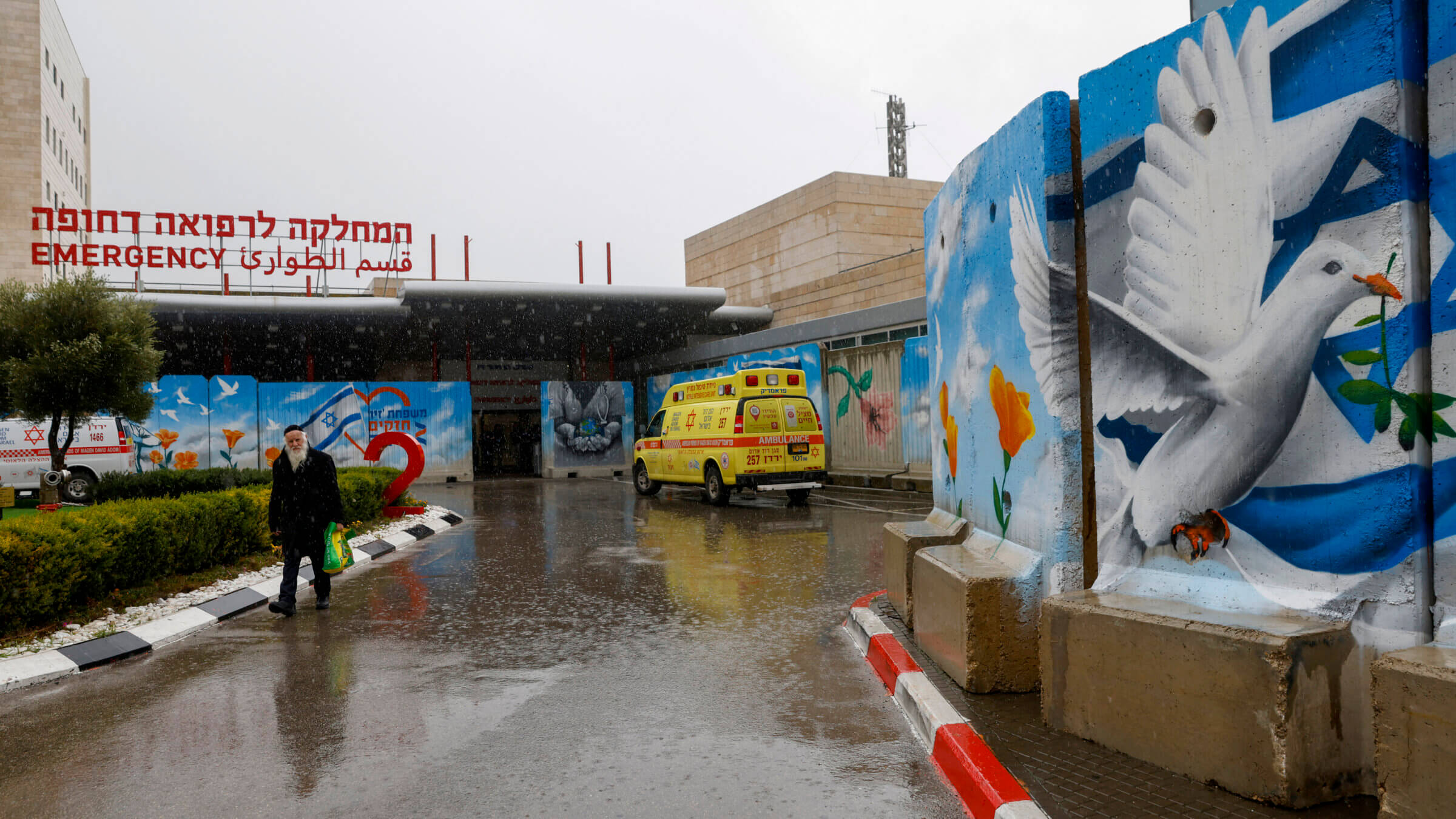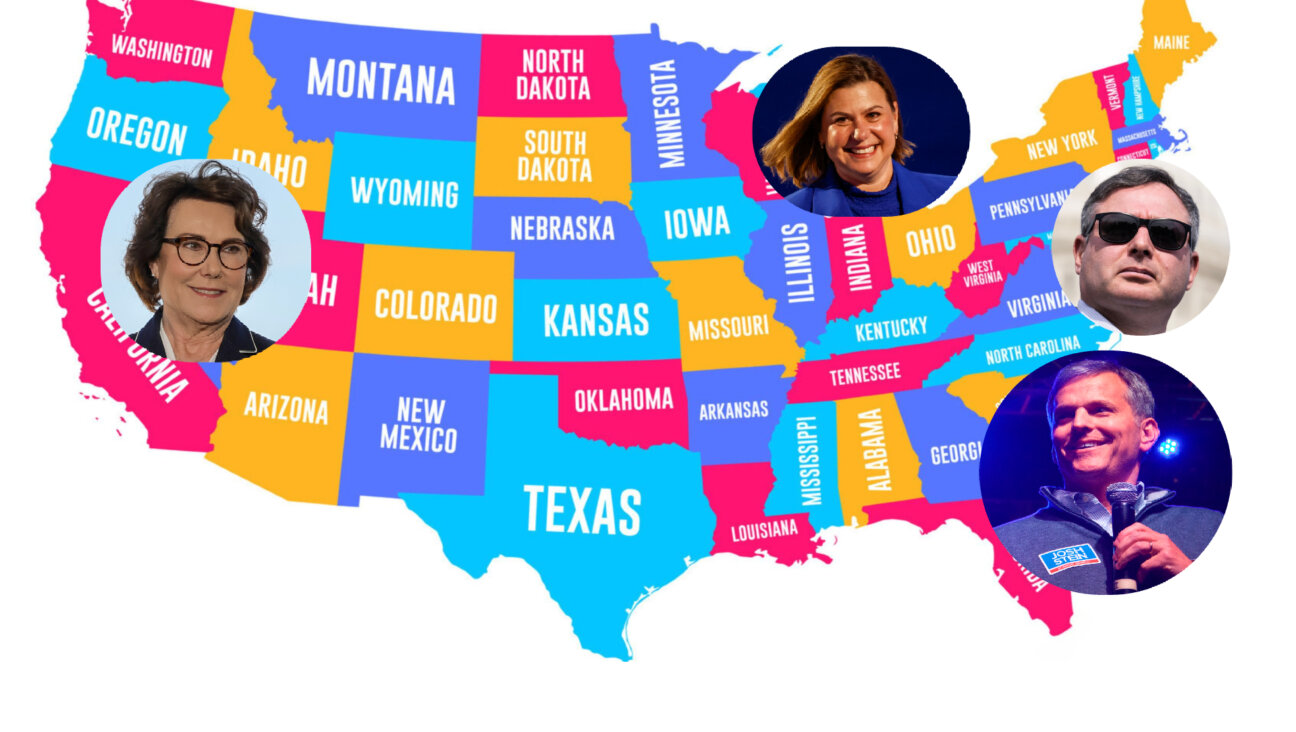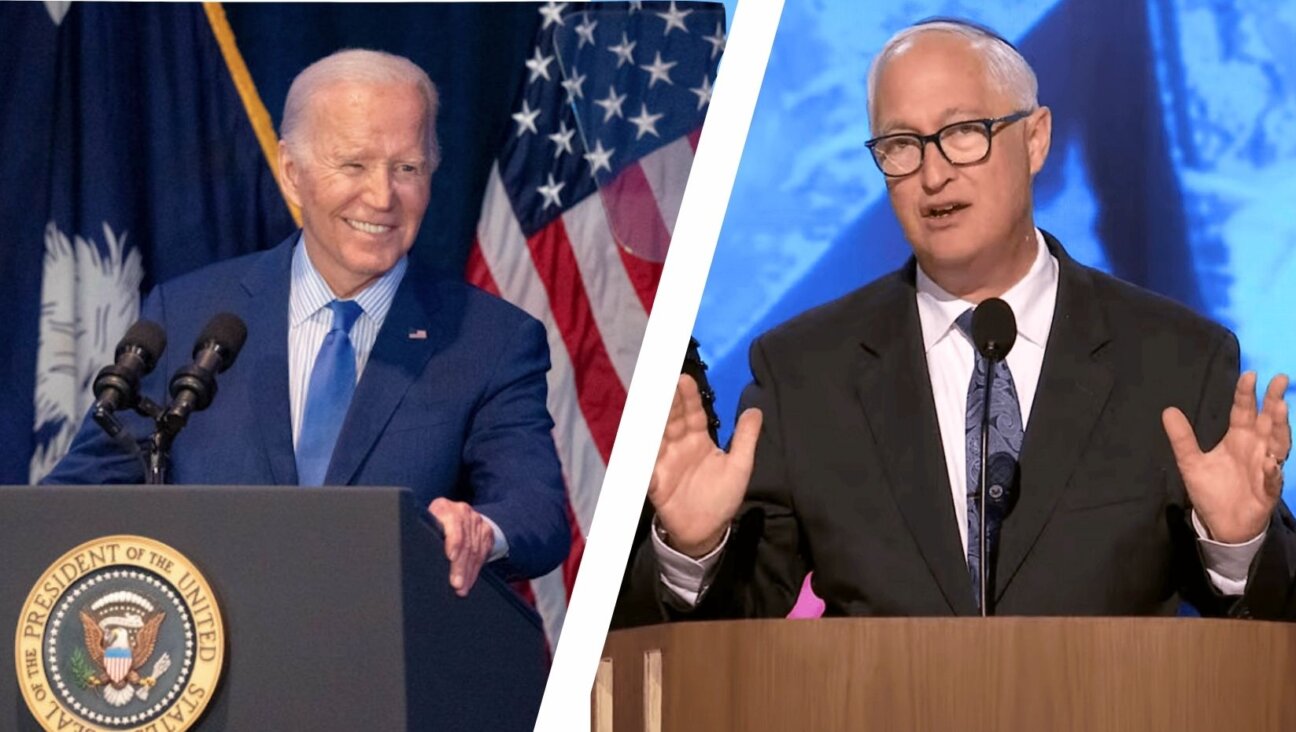After 10/7, Jewish federations raised $850 million for Israel. 40% is unspent
Federation officials want to carefully track how the funds are spent, and avoid overwhelming Israeli NGOs, but some say the money isn’t flowing fast enough

A man walks past murals outside the Ziv Hospital in the northern Israeli city of Safed in January. Jewish federations across North America have raised hundreds of millions of dollars to help Israel recover from the Oct. 7 terrorist attacks, but many of those dollars remain unspent. Photo by Getty Images
It’s rare for staff at the Jewish Federation of Los Angeles to work on Shabbat, much less make major financial decisions. But as news trickled out about a horrific terrorist attack unfolding in southern Israel on Oct. 7, senior leaders scrambled to declare an emergency that would allow them to bypass normal controls on spending and rush $8 million to the country.
Local donors eventually sent $35 million. “Money flooded into the system,” said Rabbi Noah Farkas, the federation’s chief executive.
Nearly 11 months later, about half of that money remains in the federation’s bank accounts. And LA is not an outlier: Jewish federations across North America raised more than $850 million after Oct. 7 with the promise that “100% of the funds” would go “directly to the emergency,” but 40% of it — $342 million — has not yet been spent.
The UJA-Federation of New York, which led the field with $203 million in donations, still has 45% of its haul, and Boston has not yet used $19.8 million of its $59 million collected.
“There’s not a conscious effort to hold money back,” said Jeff Schoenfeld, a retired investment banker who is helping manage distributions for the Jewish Federations of North America, an umbrella group. “It’s just not possible — in many ways — to allocate all the money all at once.”
Schoenfeld and other federation leaders attributed the slow pace primarily to three factors: They were concerned about overwhelming the relatively small Israeli nonprofit sector with an influx of too much cash all at once. They wanted to ensure there is money available to address the long-term impacts of Oct. 7 and the war on Israel’s economy and psyche. And they subjected all recipients of funds to rigorous vetting.
And some local federation officials said they don’t have access to all of the money they reported raising because donors made multi-year pledges.
But critics in Israel say there are unmet needs now, and are frustrated that the federations’ deliberate approach may be having repercussions across the broader world of Jewish philanthropy.
Ronit Segelman, an adviser to Israeli nonprofits, complained during a June forum that federations were taking too cautious of an approach. And Steve Berman, an Atlanta real estate developer, said in an interview he’d seen hesitation among private foundations as he solicited them on behalf of a kibbutz that was destroyed on Oct. 7.
“Everybody needs to see where JFNA is first,” Berman said, using the abbreviation for the federations’ umbrella group.
Divergent paths
Almost all of the $852 million for Israel came through one of the 146 local federations across the United States and Canada. Those federations handed about $235 million of it over to JFNA to allocate — 80% of that has been spent — and put the rest through their own systems.
The largest share from both JFNA and individual federations has gone to Jewish Agency for Israel ($85 million), the Joint Distribution Committee ($28 million) and nonprofits in the communities near Gaza ($64 million). Some local federations also gave substantial grants to communities in Israel where they had pre-Oct. 7 “sister city” relationships, like the Boston federation’s support for Haifa to provide emergency services to survivors.
Other money went to food and clothing for residents forced to evacuate the area near Gaza or the Lebanon border, therapy for survivors and loans for small businesses, among other programs .
Federations historically have coordinated their work with the government — waiting until Israeli officials determine how the government will respond to an emergency, for example, and then stepping in to fill gaps. But months of anti-government protests before Oct. 7, and frustration among some survivors of the attack over the government’s response, have challenged past models of cooperation.
Federation officials say no legitimate funding requests have been denied. But neither have they waived their pre-Oct. 7 requirements for requests for grants or reports on how they’re used.
The aftermath of Oct. 7 activated many American Jews — half the donors to the Washington, D.C. federation’s emergency campaign, for example, had never donated to the organization before. At the same time, some of the largest Jewish institutions in the country — including the Reform movement, JCCs and local Hillels — directed their members to contribute to the federation emergency campaign rather than fundraise for Israel themselves over the past year.
“The Jewish people are entrusting our pocketbook to federation,” Laura Shaw Frank, director for Jewish life at the American Jewish Committee, told an official from the umbrella group representing federations during a November meeting, according to a video recording. “We need a trusted organization that is going to spend our money for us.”
JFNA, the umbrella group, has shared regular reports with donors and the public showing both the total amount of money raised and how it has been spent, though most local federations have been far less transparent.
Evan Hochberg, JFNA’s deputy director for Israel, said at the November meeting that the Oct. 7 fund would take more than three years to spend down.
Schoenfeld, the retired banker who co-chairs JFNA’s allocations committee, said Israel’s capacity to absorb the funds is the main reason for delay, noting that federations also sent their typical annual grants totalling about $200 million to various organizations operating in the country. If a new crisis emerges, such as a war with Hezbollah in the north, Schoenfeld said, officials are confident donors would respond to a new emergency campaign.
“The assumption is we’re consciously saying, ‘Let’s reserve some money because we don’t know what’s ahead,’” Schoenfeld said in an interview. “That is not the reality for the JFNA money — nor it is, mostly, the reality for the system.”
Tension with government
Many Israelis in the south and north who were forced to evacuate their homes have complained that the Israeli government’s response is either too slow, too small or too cumbersome.
The federations stepped up to fill some of those gaps. American donors covered the cost of replacing farm equipment looted or destroyed in the Hamas attack, for example. If “the government decides it’s not in their coverage agenda, we’re going to step in and do what’s needed,” Schoenfeld told JTA in March. “But there’s a level of frustration.”
The federation system, though, caught some flak for a $6 million donation to Brothers and Sisters for Israel, a relief organization that grew out of the protest movement opposed to Prime Minister Benjamin Netanyahu’s plan to overhaul the country’s judicial system.
The right-wing Jewish News Syndicate published an article in June describing it as helping fund “anti-government activities in Israel,” quoting Israel’s combative diaspora minister saying that JFNA should “demand to see where the money went and how it was used.”

Eric Fingerhut, JFNA’s chief executive, called the article “misleading” in an email to member federations, saying “the article produces no evidence that our funds have gone toward any political ends.”
Then there is the matter of Kibbutz Nir Oz, which was almost completely destroyed on Oct. 7. The government plans to rebuild it, but many members do not want to return. “It’s a killing field for us,” explained Jonathan Dekel-Chen, whose son Sagui was kidnapped and taken to Gaza.
Instead, Nir Oz survivors have recently started fundraising to rebuild elsewhere. But the government won’t transfer the funds to that project, so some Nir Oz residents are hoping American philanthropists will.
“It’s going to take time to figure out,” said Dekel-Chen, a professor at Hebrew University who studies Jewish philanthropy. “It’s not a bad idea that the federations are holding onto this money, because if they were to transfer it right now to Israeli nonprofits I get the feeling that money would not end up being applied to these needs.”
Phantom funds
Of the $342 million yet to be spent, more than 80% is in the hands of local federations, which have shared far less information than JFNA about how much they have raised and where it has gone.
One complicating factor is that federations sometimes report multi-year pledges as a lump sum. Howard Rabner, chief operating officer for the Jewish Federation of Greater MetroWest in New Jersey, for example, said the organization has only collected $23 million of the $30 million pledged since Oct. 7. It has spent nearly 90% of that $23 million, Rabner said.
It is unclear how much of the $342 million unspent by local federations is similarly still outstanding from donors.
Most local federations do not post detailed information about their emergency fundraising for Israel and several declined to answer questions about it. The president of the JCC in southern Palm Beach County said in April that the local federation had raised $4.1 million. But the federation’s spokesperson, Michelle Brown, declined to confirm that figures or share how much of the money had been spent.
JFNA officials, meanwhile, said that they have detailed information on how much each local federation had raised and spent but would not share it.
Some federations acknowledged they are intentionally holding back money. “There continue to be new needs that surface, and we want to be able to help today, as we’ve been able to over the past 10 months,” said Russ Benblatt, a spokesperson for the Jewish Federation of Greater Hartford, in Connecticut.
Hartford raised $7 million, and turned $5.7 million of it over to JFNA. Of the rest, about half was allocated to Kibbutz Sufa, which sits near the southeastern border of Gaza, over three years. The remainder is being doled out in smaller grants, Benblatt said, including $26,450 to enroll Israeli students at a Hartford day school and $5,000 for a program called Cooking with Love for Soldiers.
Farkas, the Los Angeles federation leader, said that his team expects to support several more years of recovery in Israel.
“This is a very long-term process,” he said. “As trauma changes, the recovery and resilience phase may need a boost, so we’re just tracking all of this.”
Correction, September 2: An earlier version of this article incorrectly stated that the Boston Jewish federation had $30 million of its $59 million Israel emergency fund remaining. In fact, it has $19.8 in unallocated funds remaining.






















